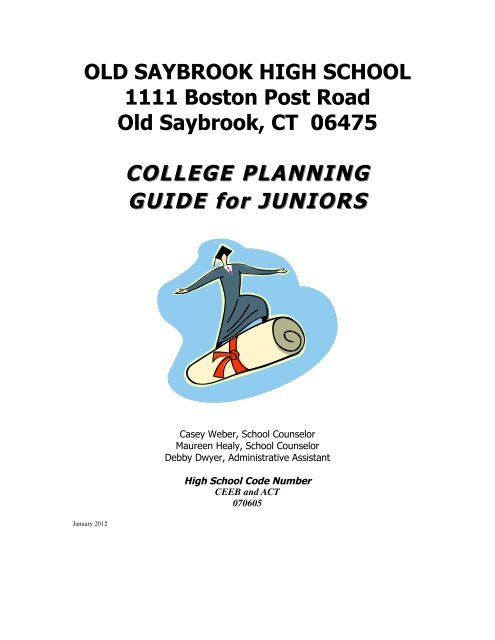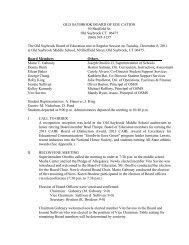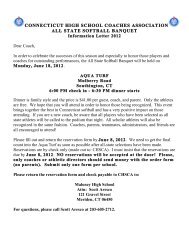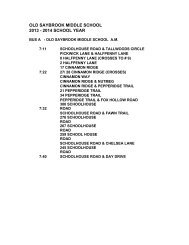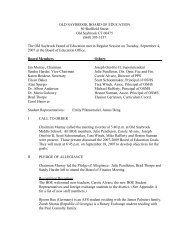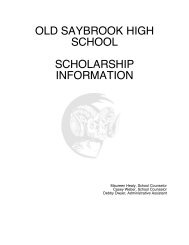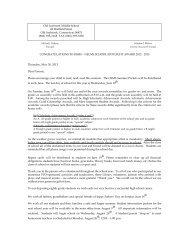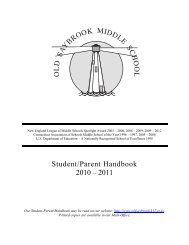OLD SAYBROOK HIGH SCHOOL 1111 Boston Post Road Old ...
OLD SAYBROOK HIGH SCHOOL 1111 Boston Post Road Old ...
OLD SAYBROOK HIGH SCHOOL 1111 Boston Post Road Old ...
Create successful ePaper yourself
Turn your PDF publications into a flip-book with our unique Google optimized e-Paper software.
<strong>OLD</strong> <strong>SAYBROOK</strong> <strong>HIGH</strong> <strong>SCHOOL</strong><br />
<strong>1111</strong> <strong>Boston</strong> <strong>Post</strong> <strong>Road</strong><br />
<strong>Old</strong> Saybrook, CT 06475<br />
COLLEGE PLANNING<br />
GUIDE for JUNIORS<br />
Casey Weber, School Counselor<br />
Maureen Healy, School Counselor<br />
Debby Dwyer, Administrative Assistant<br />
High School Code Number<br />
CEEB and ACT<br />
070605<br />
January 2012
TABLE OF CONTENTS<br />
Page 1<br />
Page 2-3<br />
Page 4<br />
Page 5<br />
Page 6<br />
Page 7<br />
Page 8<br />
Page 9<br />
Page 10<br />
Page 11<br />
Page 12<br />
Page 13<br />
Page 14<br />
Page 15<br />
Page 16<br />
Pages 17-20<br />
Page 21-22<br />
Page 23<br />
Junior Year College Planning Timetable<br />
Senior Year Timetable<br />
Preparing for the SATs – Upcoming Test Dates<br />
College Search<br />
College Admissions – Catalogs<br />
Kinds of Colleges<br />
Two Year Colleges<br />
What Are Your Chances of Admission<br />
College Visits<br />
College Visit Comparison Chart<br />
College Entrance Examination<br />
American College Testing (ACT)<br />
Sending for College Catalogs – College Interview<br />
Sample Questions – College Interviewer<br />
Sample Questions – Student<br />
Terms<br />
College Related Internet Sites<br />
Military Information Sheet
College Planning Timetable<br />
Class of 2013<br />
Junior Year<br />
December 2011<br />
January 4, 2012<br />
February 2012<br />
February 10, 2012<br />
February – May<br />
March 10<br />
• PSAT score reports distributed to all students<br />
•Junior Parents’ Night – 6:30 p.m. OSHS Auditorium<br />
• Guidance presentation through classes<br />
• Registration deadline for March 10 th - SAT I<br />
• Meet with counselors for post-secondary planning<br />
• Research schools, talk to college representatives who visit<br />
OSHS, use resources in Guidance Office<br />
• Take SAT I<br />
March • Course selection for academic year begins for 2012-2013<br />
April 6, 2012<br />
Mid April<br />
April, May, June<br />
April – August<br />
May 8, 2012<br />
May 5<br />
May 7 – 18<br />
June 2<br />
Summer Activities:<br />
• Registration deadline for May 5 th SAT I and II<br />
• Take Armed Services Vocational Aptitude<br />
Battery (ASVAB) at <strong>Old</strong> Saybrook High School<br />
• Develop a preliminary list of colleges<br />
• Write or call for applications and catalogs<br />
• Visit colleges and schedule interviews<br />
• Registration deadline for June 2 nd SAT I and II<br />
• Take SAT I or SAT II<br />
• Advanced Placement exams<br />
• Take SAT I or SAT II<br />
• Visit colleges, schedule interviews, request applications, and<br />
catalogs, start thinking about college essay topics; review<br />
for SATs; volunteer; do something extraordinary!
CLASS OF 2013<br />
SENIOR YEAR<br />
Timeline<br />
September 2012<br />
Start senior year off strong academically<br />
-Review your lists of colleges<br />
-Plan college visits and interviews with admissions offices<br />
-Call or get on line regarding information, applications and campus<br />
information sessions and tours<br />
-Remember to send thank you notes to Admission representatives if<br />
they meet with you or interview you.<br />
-Start putting together resume<br />
September 2012<br />
September 17, 2012<br />
September-October<br />
October<br />
October 15<br />
October/November<br />
November<br />
November 12<br />
THE COLLEGE APPLICATION PROCESS<br />
Evening Meeting for Senior Parents and seniors<br />
6:30 p.m., OSHS<br />
<strong>Old</strong> Saybrook High School College Fair<br />
<strong>Old</strong> Saybrook High School Gym, 6:30 – 8:00 p.m.<br />
Finalize colleges to apply to with counselor<br />
-Remember always to have safety schools<br />
-Apply Early Decision or Early Action (if appropriate)<br />
-Update resume<br />
-Request letters of recommendation from teachers and coaches<br />
Tell them to drop off to Guidance Office<br />
(Again, remember thank you notes!)<br />
-Review college representative visitation program in Guidance<br />
-Work on College Essays<br />
Take SAT I or SAT II<br />
-Make sure colleges that you are applying for are receiving your SAT<br />
score report. Can be done at time of registration<br />
Resumes due from all seniors to Guidance Office<br />
Submit college applications. Must be submitted to Guidance<br />
at least two weeks prior to application deadline.<br />
********see page 9 from application process********<br />
Take SAT I or SAT II<br />
*send your scores to four colleges<br />
Completed applications due to Guidance if college deadline is<br />
December 1, 2012.
November 30<br />
December 2012<br />
December<br />
December 2012<br />
Completed applications due to Guidance if college deadline<br />
is December 15<br />
Submit completed college applications to Guidance Office and<br />
monitor your deadlines<br />
-Research scholarship opportunities<br />
-Does your school require the CSS/Financial Aid Profile<br />
Make sure you check into that on www.collegeboard.com<br />
Take SAT I or SAT II<br />
Financial Aid Evening Program<br />
<strong>Old</strong> Saybrook High School Auditorium<br />
6:30PM<br />
**FAFSA information will be available that evening**<br />
January 1, 2013<br />
January – March<br />
February<br />
February-March<br />
March-April<br />
May<br />
June<br />
Free Application for Federal Student Aid (FAFSA) may be filed<br />
(see www.fafsa.ed.gov)<br />
Local scholarship applications available<br />
Check Guidance Office for details and check daily announcements<br />
Have you sent all necessary forms and applications for financial<br />
aid<br />
Profile, FAFSA and college financial aid forms<br />
Decide, which schools you want to revisit<br />
(Accepted Student Days)<br />
Make final decision and send deposit – check deadlines*<br />
-Write withdrawal letters to colleges you will not attend<br />
-Inform the Guidance Office of any letters of acceptance/denial and<br />
your plans<br />
-Revisit your schools if necessary<br />
Still not sure what you want to do after graduation<br />
Don’t wait, come to the Guidance Office for help.<br />
-AP Exams<br />
-Continue keeping up with academics!<br />
-Graduation! Have a great summer and good luck!<br />
* Students should review application and financial aid deadlines<br />
to all schools they apply to.
Get to know the test:<br />
HOW TO PREPARE FOR THE SATs<br />
• Do the practice tests in the SAT Registration Bulletin or online @ collegeboard.com.<br />
• SAT review books<br />
• SAT preparation courses<br />
• Take the test more than one time<br />
• Visit www.collegeboard.com for test taking tips and strategies<br />
Do the little stuff the day before:<br />
• Set your clothes out the day before<br />
• Put your pencils, calculator and admission ticket together<br />
• Go to bed early the night before<br />
• Have a good breakfast<br />
During the test:<br />
• Listen carefully to all instructions and ask questions if you hear something you don’t<br />
understand<br />
• Focus your attention entirely on your work<br />
• Before answering each question read it completely, as well as all of the possible responses<br />
• When you are unsure of an answer, narrow your choices down and choose the one you think<br />
is best and go on to the next question<br />
• Pace yourself throughout the test<br />
• If you complete the test before your time is up, go back and check your answers<br />
UPCOMING TEST DATES<br />
March 10, 2012 (SAT I only) Registration Deadline: February 10, 2012<br />
Late Registration Deadline: February 24, 2012<br />
May 5, 2012 (SAT I and SAT II) Registration Deadline: April 6, 2012<br />
Late Registration Deadline: April 20, 2012<br />
June 2, 2012 (SAT I and SAT II) Registration Deadline: May 8, 2012<br />
Late Registration Deadline: May 22, 2012<br />
REMINDERS:<br />
• Be sure to list prospective colleges on your SAT registration form so these schools receive your<br />
scores (you may choose four colleges free).<br />
• SATs are only one factor looked at by Admission Officers. Colleges admit people, not test<br />
scores.
THE COLLEGE SEARCH BEGINS WITH YOU<br />
1) You need to ask yourself these questions:<br />
What is important to you<br />
What do you value<br />
How do you learn<br />
What motivates you<br />
What do you want to study<br />
Do you like the city or natural beauty of the country<br />
Do you want the diversity of a large university or the personalization of a small college<br />
2) What are my options<br />
Four-year college or university<br />
Two-year junior or community college<br />
Full-time employment<br />
Military career<br />
3) Set realistic goals for your future:<br />
• Where do my personal strengths, weaknesses, and interests lie<br />
• What major am I interested in pursuing in college<br />
• What job opportunities does this major open up for me<br />
• What information can I gain from doing a job shadowing or internship experience<br />
4) Explore information sources:<br />
• College representatives, alumni, present college students<br />
• Guidance resources: catalogs, individual school/university viewbooks, videos<br />
• Teachers, administration, school counselors – where did they go to college What were<br />
good academic programs at their alma maters<br />
• Interview people in your field of interest<br />
• Visit college campuses - attend open houses or schedule a personal tour<br />
• Attend college fairs<br />
5) Size Up Schools: You are looking for the best match for you. Remember, no<br />
place is perfect! Consider these components when choosing a school:<br />
Academic majors<br />
Size of school<br />
Location<br />
Coed, only women, only men<br />
Atmosphere of school<br />
Campus life<br />
Social opportunities<br />
Athletics<br />
Costs<br />
Diversity<br />
Clubs/Organizations/Intramurals Admission chances (safety, reach, realistic)
GAINING ADMISSION TO COLLEGE<br />
In evaluating the candidates for admission, the college considers the following:<br />
• The student’s academic record (transcript) – THE MOST IMPORTANT FACTOR<br />
• Standardized test scores: SAT I, SAT II, ACT<br />
• Letters of recommendation<br />
• Participation in school/community/activities<br />
• Employment<br />
• Interview<br />
• Application essay<br />
READING A COLLEGE CATALOG<br />
There are several ways to find out about colleges, but the most reliable source is the college<br />
catalog. You will find many catalogs in the Guidance Office, the counselors’ offices, and the<br />
library. If you wish to have your own copy of a catalog, send a postcard to the admissions office<br />
of the college(s) you are interested in. Once you have the catalog be prepared to do some<br />
thoughtful, time-consuming research. It is advisable to read more than one catalog in order to<br />
compare colleges. In addition, college catalogs can usually be found on each individual college<br />
website.<br />
While reading look for:<br />
• The philosophy of the college. What are the objectives of the college The entrance<br />
requirements What are the minimum requirements<br />
• The total expenses. How much is the tuition Are there dormitory and boarding facilities<br />
Are there additional fees What sort of financial aid is available to entering students<br />
• The rules and regulations governing student behavior. What are the policies on hours,<br />
weekend trips, using a car, residence rules, etc.<br />
• The courses offered in your area of interest. What courses will you be required to take<br />
• The educational background of the faculty.
KINDS OF COLLEGES<br />
College: An institution that offers educational instruction beyond high school level in a twoyear<br />
or four-year program.<br />
University: An academic organization which grants undergraduate and graduate degrees in a<br />
variety of fields and which supports at least two degree-granting professional schools that are not<br />
exclusively technological (such as medicine, journalism, or agriculture). It is composed of a<br />
number of ‘schools’ each of which encompasses a general field of study.<br />
Liberal Arts College: A liberal arts college generally has fewer than 5,000 students and can<br />
be either a two or four year institution. The mission of most liberal arts schools is learning for the<br />
sake of learning with a strong emphasis on creating lifelong learners who will be able to apply<br />
their education to any number of careers. This contrasts with objectives of the profession-based<br />
preparation of specialized colleges.<br />
Engineering or Technological College: Independent professional schools which provide<br />
four-year training programs in the field of engineering technology or polytechnic institutes.<br />
Technical School: A two-year institution which offers terminal occupational programs intended<br />
to prepare students for immediate employment in fields related to engineering and the physical<br />
sciences. These schools may also offer one-year certificate programs in certain crafts and clerical<br />
skills.<br />
Nursing School: There are three kinds of nursing education. At schools affiliated with<br />
hospitals, students receive RN degrees upon completion of their training. At schools affiliated<br />
with four-year colleges students receive both a BS degree and a RN and have possibilities of<br />
entering the field of nursing administration. At schools associated with two-year colleges,<br />
students receive both an associate degree and a RN.<br />
Military School: Federal military academies prepare officers for the Army, Navy, Air Force and<br />
Coast Guard. These institutions, with the exception of the Coast Guard Academy, require<br />
recommendation and appointment by a member of Congress. Private and state-supported<br />
military institutes, however, operate on a college application basis. They all offer degree<br />
programs in engineering and technology with concentration in various aspects of military service.
Why a two-year college after high school<br />
TWO-YEAR COLLEGES<br />
ASSOCIATE DEGREE PROGRAM<br />
• Education and training for the student who wishes to complete his/her formal schooling in two<br />
years<br />
• General education to prepare youth for effective personal and community living<br />
• Orientation and guidance to help the student discover his best talents, find a direction in life,<br />
and prepare successfully for a vocation<br />
• Courses equivalent to freshman and sophomore work in senior colleges leading to satisfactory<br />
accomplishment in further studies in liberal arts, education, science and engineering<br />
• Opportunity to remove matriculation deficiencies. If a student’s high school record does not<br />
meet the admissions standard of a particular four-year college, the student may prove himself<br />
in a two-year program after which a four-year school may be willing to accept him.<br />
Two Types of Programs:<br />
• TERMINAL – Designed for students who will enter an occupation or assume home civic<br />
responsibilities immediately after graduation.<br />
• General Education: Social Studies, English, the arts, languages and literature but not<br />
working toward a bachelor’s degree<br />
• Vocational: Designed to prepare for immediate entry into one of the semiprofessional<br />
or technical fields<br />
• TRANSFER – Designed to prepare for immediate entry into one of the semi-professional<br />
or technical field<br />
Admissions Requirements:<br />
As with four-year colleges, admission requirements to a two-year college vary widely from one<br />
school to another.<br />
The entire school record, test results, and references are evaluated. Be sure to check the<br />
admissions requirements of any school you are particularly interested in.<br />
Generally speaking, entrance requirements for programs in the health field (dental,<br />
physical therapy, occupational therapy, radiation technology, and nursing) are more<br />
strict than for admission into other programs.
WHAT ARE YOUR CHANCES FOR ADMISSION<br />
Narrow your list of possible college choices down, select one or two colleges which fit into the<br />
following three categories:<br />
REACH:<br />
Presents an admission challenge for you. Your academic qualifications may not<br />
exactly match the profile of typical students admitted.<br />
TARGET/REALISTIC:<br />
Your academic qualifications closely match the requirements of<br />
the school, and those of a typical student they may admit.<br />
SAFETY:<br />
Your qualifications exceed the profile of the typical student admitted to the college.<br />
IMPORTANT POINTS TO KEEP IN MIND WHEN CHOOSING COLLEGES<br />
• Give as much thought to your middle and safety schools as your reach schools<br />
• Apply only to schools where you believe you would be happy for four years<br />
• Visit all schools which make your final list<br />
• Remember, you are looking for the best match for you!<br />
PROCEDURES FOR APPLYING TO COLLEGE<br />
• Once you have decided which colleges you will be applying to, you will need to complete a<br />
college application folder (available in the Guidance Office) for each school.<br />
• The completed application folder and a copy of your resume must be given to your counselor<br />
at least two weeks prior to the application deadline. There is a $3.00 mailing fee for each<br />
application.<br />
• The Guidance Office will provide an official copy of your transcript and letters of<br />
recommendation for each application.
COLLEGE VISITS<br />
YOU SHOULD VISIT ALL <strong>SCHOOL</strong>S THAT MAKE YOUR FINAL LIST!<br />
-Go on college visits during junior/senior years<br />
-To get the best view of the college, you should schedule a college visit when school is in session.<br />
This allows you to get a sense of the school and campus life.<br />
-Make an appointment for a visit. This should be scheduled 2-4 weeks in advance.<br />
-Attend an open house sponsored by the college. Open houses are usually advertised on school<br />
websites<br />
1) Go prepared: -Read the viewbook, catalog, and admission requirements<br />
-Have a few questions prepared before the visit<br />
-Bring an unofficial copy of your transcript and latest report card<br />
2) Visit different parts of the campus:<br />
-Eat in the cafeteria<br />
-Visit a dorm room<br />
-Sit in on a freshman class -Visit the library and computer facilities<br />
-What other amenities does the school have to offer: gym, pool, field house, student<br />
center…<br />
3) Talk to people while on the campus:<br />
-Make appointments to meet with financial<br />
aid office, admissions office, coaches<br />
-Faculty members in your intended major<br />
-Talk to students in your intended major<br />
-Talk to students about campus life, how<br />
they like the school and weekend activities<br />
4) Important information to come away with<br />
from your college visit:<br />
-student to faculty ration -parking availability/registration<br />
-housing availability options -student activities/clubs/social events<br />
-faculty availability<br />
-size of typical classes<br />
-campus safety<br />
-additional services available to students: counseling, career placement and planning,<br />
freshman and/or writing centers, computer assistance, internet access from your dorm<br />
room<br />
5) Write impressions of college, campus atmosphere, available services and<br />
senses of student body immediately after you visit.<br />
How comfortable you felt on the visit could be a good indication of how you would feel on<br />
campus as a student.
COLLEGE ENTRANCE EXAMINATIONS<br />
Entrance examinations are required for admission at most colleges. Students should carefully<br />
check the admissions requirements at prospective colleges to determine whether SAT I or SAT II<br />
tests are required or if the American College Testing (ACT) is an acceptable alternative.<br />
CEEB – COLLEGE ENTRANCE EXAMINATION BOARD<br />
1) What is the SAT I<br />
The Scholastic Aptitude Test (SAT) is an examination that measures mathematical problem<br />
solving, reading for understanding and writing using standard English.<br />
2) What is the SAT II<br />
SAT II is a one-hour examination that measures the student’s level of achievement in<br />
certain subject areas. Some colleges require or recommend three subject Achievement<br />
Tests for admission or placement purposes. Up to three subject tests may be taken at one<br />
sitting.<br />
3) How do I know which SAT II tests to take<br />
You should take the SAT IIs in those subject area sequences which you are completing this<br />
year and in any one-year subject which you will want to offer in your college admission<br />
credentials or for which a particular college requires. For instance, if you are finishing your<br />
study of a foreign language, you would take the Achievement Test this year rather than<br />
delay it until your senior year, when you will no longer be studying the subject. Also, if you<br />
are currently taking Chemistry or a similar one-year course and wish to offer this test for<br />
college admission, you should take the Achievement Test in May.<br />
4) Which mathematics Achievement Test should I take<br />
Most candidates take the Level I Mathematics Achievement Test regardless of the number<br />
of years they have studies mathematics. The Level II test is narrower in scope and<br />
concentrates on more advanced work. It calls for a greater depth of understanding and<br />
sophistication. Calculators may be used. Please consult with your present math teacher to<br />
get the proper placement.<br />
5) When should I take the examinations<br />
There is no need for a student to take the SAT I or SAT II more than once before senior<br />
year unless he/she must do so to meet the requirements of a specific college (early<br />
decision), or if his/her scores seem low and inconsistent with his/her academic record<br />
and/or PSAT scores. Then he/she may wish to repeat this test.
ACT – AMERICAN COLLEGE TESTING<br />
ACT examinations are required for admission at many colleges, especially in the west and<br />
midwest. Students should carefully check the admissions requirements at their prospective<br />
colleges to determine whether SAT tests are required or whether the ACT would be an acceptable<br />
alternative.<br />
1) What is the ACT<br />
The ACT is a four-part, two hour and forty minute test of the abilities which students will<br />
need to succeed in college work. It deals more with the use of skills than with specific<br />
subject matter. In addition, the student is asked to complete a 25-minute Student Profile<br />
Section to indicate his/her grades, background, goals, personal needs, and non-classroom<br />
activities.<br />
2) What areas of study are tested<br />
English Usage:<br />
Mathematics Usage:<br />
Social Studies Reading:<br />
Measures students’ understanding of conventional standard<br />
English and their ability to produce a direct writing sample<br />
Measures reading comprehension, special study skills,<br />
and problem solving<br />
Measures reading comprehension, special study<br />
skills and problem solving<br />
Natural Science Reading: Measures evaluative and critical reasoning and problem solving<br />
skills<br />
3) When and where do I take the ACT Exams<br />
In most cases it is advisable to take the ACT examinations as early as possible in the senior<br />
year. Sign up on the website.<br />
4) Why does the ACT request my high school grades<br />
ACT reports, to the colleges that you designate, a predictive correlation between your test<br />
scores and your grades to estimate how well you will probably do in college work.<br />
5) May I repeat the ACT Examination<br />
Re-testing is only recommended if the student were physically ill, emotionally upset,<br />
misunderstood directions, or attempted in any way to falsify his/her record during the<br />
initial examination. As scoring is weighted to compensate for different test dates, a later<br />
testing would be likely to improve scores.
YOUR COLLEGE INTERVIEW<br />
A personal interview with a member of an admissions staff is an advantage to all concerned.<br />
Visiting a college campus gives the prospective student a first-hand look at the students and<br />
faculty, the program, and physical facilities which no catalog can do. Guided tours of a campus,<br />
sitting in on a class and talking with students and faculty are all invaluable.<br />
The fact that a prospective student is interested enough to visit the campus and to talk with the<br />
admissions staff indicates a serious interest and gives the college a chance to find out more about<br />
you as a person. The college considers the personal conference to be of great value and<br />
importance as a basis for evaluation. If feasible, this personal interview should take place during<br />
the spring of your junior year or early in your senior year while college is in session.<br />
Your interviewer will want to know what your goals and interests are, and in which programs you<br />
might possibly be interested. If you are not sure of your choice of major program tell your<br />
interviewer. Perhaps he will have some helpful suggestions. If you will need financial assistance,<br />
discuss this at the time of the interview so you will know what funds the college has available for<br />
academic scholarships, part-time work and student loans.<br />
Do not be afraid to ask about your chances of being accepted. You won’t get a firm commitment,<br />
but you will get an indication of whether or not you live up to the college’s academic standards.<br />
Be sure to ask your student guide about classes, extracurricular activities, residence rules,<br />
transportation, medical services, churches, etc. Do take a good look at the library, studios,<br />
laboratories, dormitory rooms and all other facilities.<br />
If you cannot visit the campus, notify the admissions office and they will ask an alumna or other<br />
college representative in your area to interview you.
SAMPLE QUESTIONS ASKED BY COLLEGE INTERVIEWER<br />
The purpose of a college interview is two-fold: to give you a chance to meet personally with a<br />
representative and ask questions you have about the college; and to give the college<br />
representative an opportunity to see first-hand what you are like as an individual.<br />
It may help you to be at ease in the interview if you have some idea in advance of the kinds of<br />
questions you might be asked. While no two interviews will be the same, recent high school<br />
graduates report that the questions below were some of the most commonly asked:<br />
• What major field are you interested in<br />
• Why did you pick this college<br />
• What are your extra-curricular activities, both in school and in the community<br />
• What were your scores on the College Boards (SAT)<br />
• What are you interested in doing after college<br />
• What subjects are you taking in high school<br />
• What books have you read not required by classroom teachers during the past year<br />
• What are your favorite school subjects<br />
• What have you done with your summers<br />
• What do you like about the college<br />
• How many are in your family<br />
• How large is your graduating class<br />
• Do you have any scholastic problems<br />
• What is your average grade<br />
• What questions would you like to ask<br />
• Why do you want a college education<br />
• What do you think a college education is<br />
• Who or what influenced you to choose the college<br />
• What have you done in your proposed major field<br />
• Do you know any alumni or present students<br />
• Have you definitely decided upon your future plans, and do you think you can accomplish<br />
these plans<br />
• Have you written any long term papers On what subjects<br />
• What other schools have you applied to<br />
• What do you know about the college<br />
• Is this your first college decision<br />
• Do you intend to work while in college<br />
• Do you have much composition writing in school<br />
• What do you cover in English class<br />
• What subjects do you dislike the most
QUESTIONS STUDENTS MIGHT ASK AT AN INTERVIEW<br />
• What is the student-faculty ratio<br />
• What is the attrition rate at your college for the previous academic year<br />
• What is the size of the freshman class that you plan to accept for next year, provided your<br />
attrition rate remains constant<br />
• What is the size of the resident population that you can accommodate without overcrowding<br />
your facilities<br />
• Does the college anticipate an increase in the prices it will be charging next year<br />
• Does the college offer any programs that have a quota What is the rationale for this<br />
limitation on numbers<br />
• What are the new majors/minors that have been added to the curriculum to meet job market<br />
needs in the last three years<br />
• Is the college researching any new concentrations that might be marketable<br />
• How has it expanded its physical plant within the last five years<br />
• What academic majors include work experience opportunities<br />
• How many students does a freshman advisor have as his/her official advisement responsibility<br />
• What was the total amount of money spent by the college on financial aid last year<br />
• Does the college award any scholarships on the basis of academic merit or talent<br />
• How many transfers were accepted into the college last year<br />
• How successful have graduates in my intended major been in getting jobs in their own or<br />
related academic areas<br />
• What is the placement rate in professional and graduate schools<br />
• What are the chances of being admitted based on my high school record<br />
Don’t forget:<br />
Research the college<br />
before your interview!
TERMS<br />
When you plan for college you need to understand certain terms that are commonly used by<br />
colleges to describe their programs, admissions procedures, and financial aid policies. The<br />
definitions given here are necessarily general, and it is suggested that students consult the<br />
college catalogs of specific institutions in order to get more accurate, detailed and up-to-date<br />
descriptions of the procedures, programs and practices discussed.<br />
Admission Tests – See SAT, SAT II Tests, and ACT<br />
Advanced Placement: Admission or assignment of a freshman to an advanced course in a<br />
certain subject on the basis of evidence that he/she has already completed the equivalent of the<br />
college’s freshman course in that subject. In some cases the college may also grant academic<br />
credit for the college-level work that has been completed.<br />
Advanced Placement Program (APP): A service of the College Entrance Examination<br />
Board that provides schools with course descriptions in college subjects and Advanced Placement<br />
Examinations in those subjects. Schools administer that examination to qualified students and<br />
several hundred participating colleges offer advanced placement, college credit or both to<br />
students who obtain satisfactory grades. (See Advanced Placement)<br />
American College Test (ACT) Assessment: A battery of tests similar to the<br />
SAT Is offered by the American College Testing Program, given at test centers in the United<br />
States and other countries on specified dates throughout the year. It includes tests in English<br />
usage, mathematics usage, social studies reading, and natural sciences reading. The composite<br />
score referred to in some colleges’ descriptions and tables is the average of a student’s score on<br />
these four tests.<br />
Associate’s Degree: The degree given for completing certain undergraduate college<br />
programs of at least two but less than four years of study, usually in a two-year institution such<br />
as a junior college or community college.<br />
Bachelor’s Degree: The degree given for completing certain undergraduate college<br />
programs that normally take four years. Also called the Baccalaureate Degree.<br />
Pell Grants: A federally sponsored and administered program that provides grants based on need<br />
to undergraduate students. The grants cannot exceed $2,200 per year but Congress often sets a<br />
lower ceiling.<br />
Calendar: The system by which an institution divides its year into short periods for instruction<br />
and awarding credit. The most common calendars are those based on semesters, trimesters and<br />
quarters.<br />
Candidates Reply Date Agreement (CRDA): A college subscribing to this agreement will not<br />
require any applicant offered admission as a freshman to notify it of his/her decision to attend (or<br />
to accept an offer of financial aid) before May 1. The purpose of the agreement is to give
applicants time to hear from all of the colleges they have applied to before they have to make a<br />
commitment to any one of them.<br />
Certificate Program: An educational program to prepare students for immediate employment<br />
after completing it. The term usually refers to a program that takes less than four years beyond<br />
high school to complete, such as many of the programs in junior colleges, community colleges<br />
and vocational-technical institutes.<br />
College Scholarship Service (CSS): An activity of the College Board that provides colleges<br />
and scholarship agencies with an estimate of the amount of money an applicant’s family might<br />
reasonably be expected to pay toward his/her college expenses. This estimate is based on<br />
information that the family has given about its income and assets and is sent to the college<br />
scholarship agencies in determining how much financial aid, if any, an applicant will need in order<br />
to meet the full costs of attending particular colleges.<br />
Early Admission: Currently available in a limited number of schools. Students apply early, are<br />
notified of acceptance early are not obligated to attend.<br />
Free Application for Federal Student Aid (FAFSA): A financial information collection<br />
document of the College Scholarship Service (CSS), used by independent students or parents of<br />
dependent students to supply information about their income, assets, expenses, and liabilities.<br />
The CSS uses this information in estimating how much money a family is expected to contribute<br />
to a student’s college expenses. Most post-secondary institutions are requiring the use of this<br />
form.<br />
Early Decision: Candidates can apply in November or December and learn the colleges<br />
decision a month or so after deadline. Accepted students are binded to enroll at the college<br />
which accepts them.<br />
The Profile: Another financial aid form which must be completed by the students/parents if they<br />
want to be considered for financial aid. This form is used by a small number of colleges listed on<br />
the form.<br />
Honors Program: Any special program for very able students, usually offering the opportunity<br />
for educational enrichment, independent study, acceleration, or some combination of these.<br />
Independent Study: Any arrangement by which a student is allowed to complete some of<br />
his/her college program by studying independently instead of attending scheduled classes and<br />
completing group assignments. Typically the student plans his/her program of study, often on<br />
topics of his/her own choice, in consultation with a faculty advisor or committee, to whom he/she<br />
may report periodically and submit his/her final report for evaluation.<br />
Preliminary Scholastic Aptitude Test (PSAT)<br />
National Merit Scholarship Qualifying Test (PSAT/NMSQT):<br />
Approximately a two-hour version of the College Board’s Scholastic Aptitude Test (SAT) measuring<br />
verbal and mathematical abilities that are important in many college programs. Schools<br />
administer the PSAT/NMSQT) each year in October.
Quarter: A period of about 11 weeks, four of which comprise an academic year. In colleges<br />
following the quarter calendar, a student makes normal progress by attending three quarters each<br />
year. In some colleges a student can accelerate his/her program by attending all four quarters in<br />
one or more years.<br />
Reserve Officers’ Training Corps (ROTC): Reserve Officers’ Training Corps program<br />
conducted by certain colleges in cooperation with the United States Air Force, Army and Navy.<br />
Local recruiting offices of the services themselves can supply detailed information about these<br />
programs, as can the participating colleges.<br />
SAT II Tests: College Entrance Examination Board tests in specific secondary school<br />
subjects, given at test centers in the United States and other countries on specified dates<br />
throughout the year. These tests measure a student’s knowledge of particular subject areas.<br />
Colleges that require these tests of applicants may specify the subjects and dates. Used by<br />
colleges not only in deciding about admissions but also in course placement of enrolled students.<br />
Scholastic Aptitude Test (SAT I): The College Entrance Examination Board’s test of writing,<br />
verbal and mathematical reasoning abilities, given on specified dates throughout the year at test<br />
centers in the United States and other countries. Required of all applicants by many colleges and<br />
sponsors of financial aid programs.<br />
Semester: A period of about 17 or 18 weeks making up half of the usual academic year in<br />
colleges that follow this kind of calendar. See: Calendar, Trimester and Quarter<br />
Study Abroad: Any arrangement by which a student is enabled to complete part of his/her<br />
college program – typically the junior year but sometimes only a semester or a summer – of study<br />
in another country. His/her own college may operate the campus abroad or it may have a<br />
cooperative agreement with some other American college or an institution of the other country.<br />
3-2 Liberal Arts and Professional Studies Combination: Program in which a student<br />
completes three years of study in a liberal arts college followed by two years in professional<br />
studies, usually in another institution.<br />
Transfer Student: A student who enrolls in a college after having previously attended one or<br />
more other colleges.<br />
Trimester: Three periods of about 15 weeks, with breaks in-between, which fill a calendar year.<br />
A student makes normal progress by attending two of the trimesters each year, and in some<br />
colleges he/she can accelerate his/her program by attending all three trimesters in one or more<br />
years.<br />
University – Parallel Program: An educational program in a two-year college that is<br />
equivalent to the first two years of a similar program in a four-year college or university. The<br />
university-parallel program is designed to qualify a student for entrance to the third year of the<br />
four-year program with full credit for the two years already completed.<br />
Upper-Division College: An institution offering bachelor’s degree programs that begins with the<br />
junior year.
Bookmark These College Related Internet Sites<br />
TEST PREP:<br />
www.testprepreview.com<br />
www.kaplan.com<br />
www.collegeboard.com<br />
RESEARCHING COLLEGES:<br />
Choices College Planner www.portfolio.bridges.com<br />
Virtual College Tours www.campustours.com<br />
College Express<br />
www.collegeexpress.com<br />
College View<br />
www.collegeview.com<br />
College Link<br />
www.collegelink.com<br />
U.S. Dept. Of Education www.ed.gov<br />
College Board Online www.collegeboard.com<br />
Peterson’s<br />
www.petersons.com<br />
Miscellaneous Sites<br />
www.edweek.org<br />
www.collegefreshman.com/<br />
www.yahoo.com/education/collegeentrance<br />
Google’s University Searches www.google.com/options/universities.html<br />
APPLYING TO COLLEGE:<br />
The following websites can assist you with the application process. A number of<br />
colleges and universities have made their application available via the Internet to<br />
make applying more convenient for the student. These applications can be filled out<br />
on line and printed.<br />
www.collegelink.com/, www.nassporg/, www.commonapp.org<br />
FINANCIAL AID SITES AND SCHOLARSHIP SEARCH SITES:<br />
Nellie Mae Loans<br />
www.nelliemae.org<br />
Federal Aid Form<br />
www.fafsa.ed.gov/<br />
Federal Family Ed Prog. www.salliemae.com or www.cashe.com<br />
Free Scholarship Search www.fastweb.com & www.brokescholar.com<br />
Financial Aid info page www.finaid.org<br />
Student Guide to your<br />
Education<br />
www.ed.gov<br />
National Assoc. of Student<br />
Financial Aid Admin. www.nasfaa.org<br />
Grants<br />
www.yahoo.com/education/grants<br />
Other:<br />
www.ed.gov/proginfo/sfa/fye/<br />
www.ed.gov/offices/OPE/Student/hopegd.html<br />
Educational Opportunities in CT www.ctdhe.commnet.ed<br />
Educational Financing Authority<br />
In Mass.<br />
www.mefa.org
ATHLETES:<br />
athletes.com/NCAA.org<br />
BOOKS:<br />
Colleges That Change Lives – Loren Pope, Penguin Books<br />
Profiles of American Colleges – Barron’s Educational Series, Inc. – published annually<br />
Peterson’s Four Year Colleges – Peterson’s – published annually<br />
Best 361 Colleges – Princeton Review, published annually<br />
Cool Colleges: For the Hyer – Intelligent, Self-Directed, Late Blooming and Just Plain Different -<br />
Donald Asher, Ten Speed Press<br />
Best Buys in Higher Education – Barron’s Educational Services<br />
Choosing the Right College – Intercollegiate Studies Institute<br />
America’s Best Colleges for B Students – Supercollege<br />
Questions and Admissions: Reflections on 100,000 Admission Decisions at Stanford – Stanford<br />
University Press<br />
Launching Your Child from High School to College- W.W. Norton<br />
College Knowledge, 101 Tips for the College Bound Student – University of Michigan Press<br />
College Match: A Blueprint to Choosing the Best School for You – Steven Antonoff and Marie<br />
Friedemann, Octameron Associate
MILITARY ENLISTMENT<br />
Students planning to join a branch of the Armed Services upon graduation from high school are<br />
encouraged to take the Armed Services Vocational Aptitude Battery (ASVAB). This battery is<br />
given at the high school at no cost and with absolutely no student obligation to the military.<br />
When individuals who took the ASVAB as high school seniors seek to enlist in one of the military<br />
services within two years of having taken the test, their results from the school testing program<br />
will be used to determine job guarantees for the enlistee unless the job he/she is seeking is one<br />
of those few which require additional qualifications.<br />
Military enlistees should also be aware of the fact that they are eligible for benefits under the<br />
Veteran’s Educational Assistance Act, a voluntary program funded by the Veteran’s Administration.<br />
US Coast Guard<br />
United States Air Force<br />
Recruiting Service<br />
USAF Recruiting Office<br />
Federal Office building<br />
Union Station<br />
135 High St., Room 330 New London CT 06320-6373<br />
Hartford CT 06103 860-442-1707<br />
860-722-3457<br />
Navy Recruiting Station<br />
Connecticut Army National Guard<br />
55 Church Street Suite 103 National Guard Armory<br />
New Haven, CT 06510<br />
249 Bayonet Street<br />
203-865-1005 New London CT 06320<br />
860-441-2977<br />
United States Marine Corps<br />
United States Army<br />
200 Main St. Recruiting Station<br />
Middletown CT 06457<br />
170 Main Street<br />
860-346-3525 Middletown CT 06457<br />
860-347-3972<br />
United States Army<br />
New London Recruiting Station<br />
78 Howard St.<br />
New London CT 06320<br />
860-442-7653


